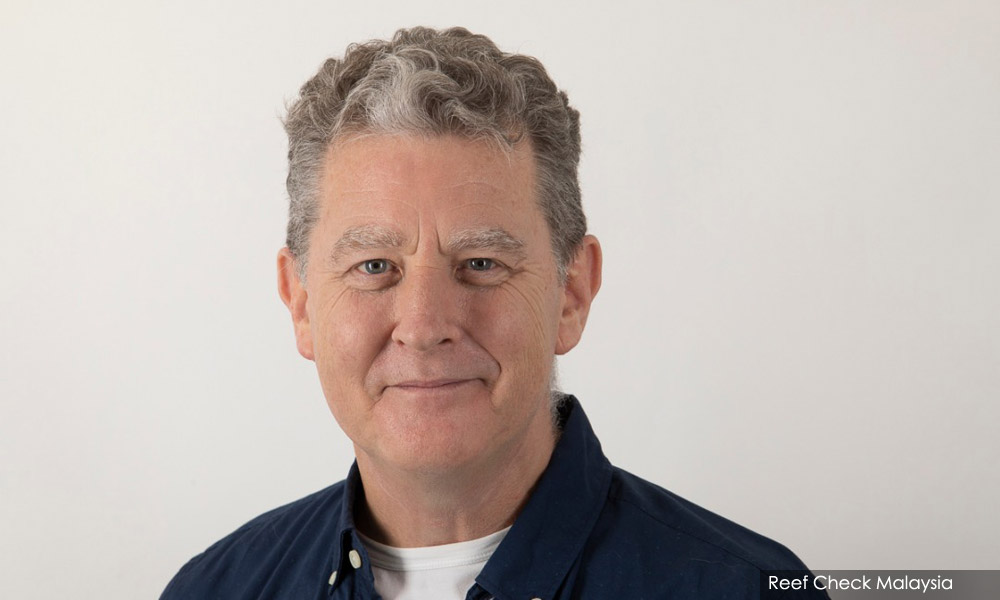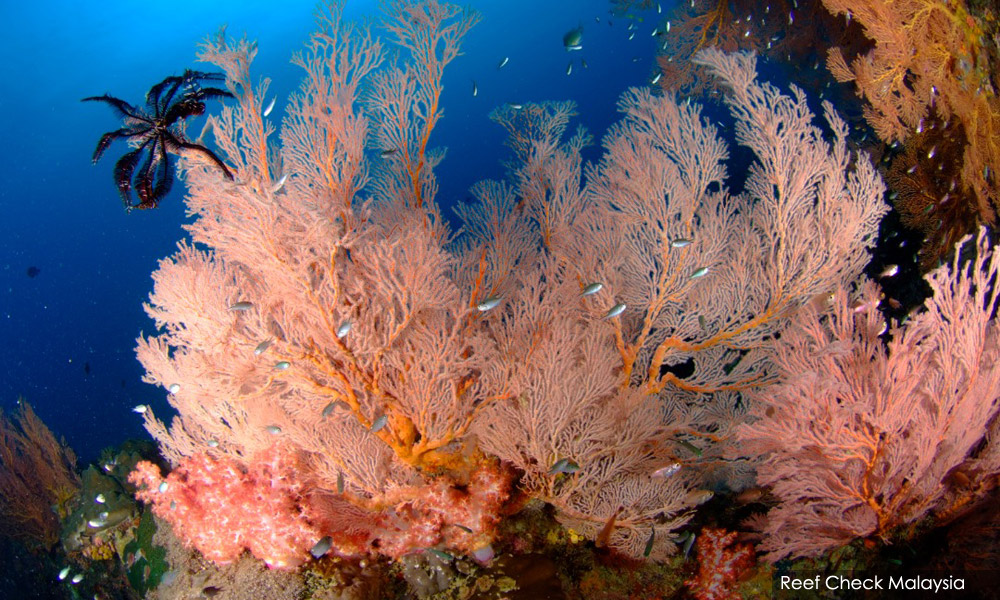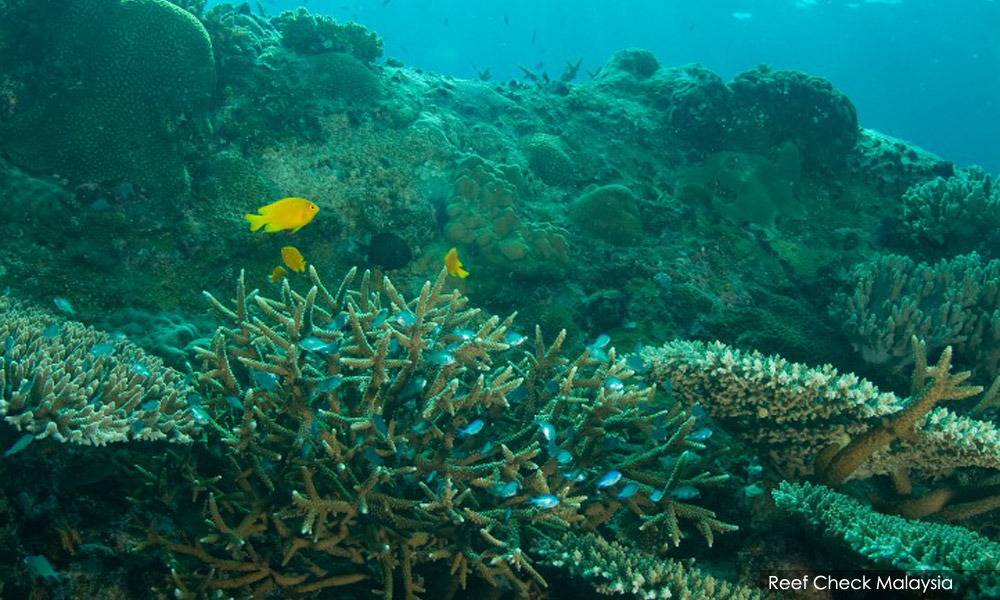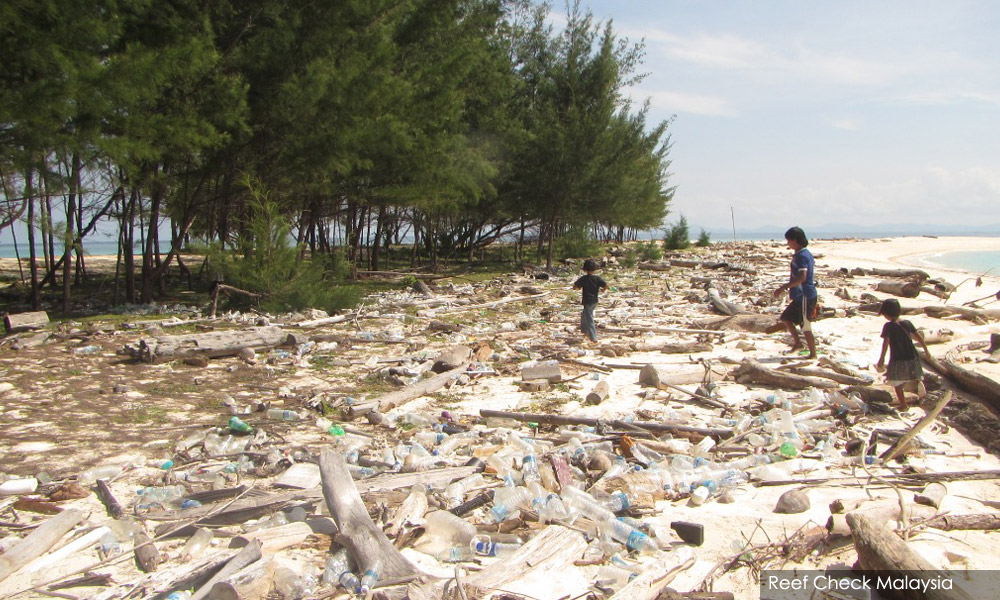Registered in Malaysia in 2007 as an NGO, Reef Check Malaysia’s early work focused on coral reef monitoring and education programmes. Today, they monitor over 200 coral reefs across the country and carry out conservation efforts.
Reef Check Malaysia (RCM) is part of the worldwide Reef Check network.
In an interview with Malaysiakini, RCM general manager Julian Hyde said he has been a diver for more than 30 years and loved the feeling of being underwater,
“It’s the only thing we can do, apart from space travel, where you are effectively moving around without the influence of gravity. So, you are floating around in this quiet space with amazing things to look at. The variety of life is amazing, from the big stuff like whale sharks down to tiny nudibranchs,” Hyde explained.
He moved on to what RCM does and explains that it started with a simple programme – to monitor the health of coral reefs around Malaysia.
“But we have slowly evolved into an organisation that does much more. We started marine education programmes on the islands of the East Coast, back in 2009. We became more involved in advocating for marine conservation.
“But more recently, we have increasingly been working with local stakeholders to find ways for them to participate in management. Our latest work is creating the greatest impact – we are working with the Department of Fisheries on their Reef Care programme, which gives local stakeholders some responsibilities for managing reefs in their area,” he said.

Hyde said RCM now has teams in all seven villages on Tioman island conducting conservation activities such as ghost net removal, monitoring, restoration and other programmes. This, he said, is helping local communities to have a direct impact on coral reef health on the islands.
Over the years, Hyde said, people generally talk about conservation and protecting the environment in reaction to disasters, but he noted that RCM is seeing more people taking a proactive approach.
“Instead of waiting for a disaster to happen, people are looking more carefully at how they can prevent the problems from arising in the first place.
“That’s where local conservation teams such as the Reef Care programme can help. But we still need to do more – we can see the effects of climate change; that’s only going to get worse before it gets better, and we need to invest more in protecting reefs and the communities that rely upon them,” Hyde said.
On the impact that pollution and climate change have on coral reefs, Hyde explained that they can be divided into local threats and global threats.

“Local threats are things that happen on the islands – siltation released from construction sites, sewage pollution, physical impacts from marine tourism and so on.
“Many of those impacts can be reduced at a local level, and most are under reasonable control – though improvements are always possible.
“Global threats are a problem on a bigger scale, mainly related to CO2 emissions and global and ocean warming. Warm water can cause corals to expel the photosynthetic algae that normally live inside their tissue, and which provide corals with most of their nutrients.
“In this ‘bleached’ condition, corals can survive a certain time, but if the water stays too warm for too long, corals will start to die and this affects the ecology of the whole reef – including the many creatures that inhabit reefs,” he added.
Malaysia’s corals are resilient
Hyde said that to date, Malaysia’s coral reefs have shown that they are very resilient. The last major coral bleaching event was in 2010 and RCM estimates that 10-15 percent of corals died.
“But our annual surveys saw that coral reefs bounced back in about three to four years, returning to the same live coral cover as before the bleaching event in 2010.
“However, since then, there has been a slow decline – about 1-2 percentage points per year, so nothing startling… but if the trend continues, the trajectory for reef health is quite clear. And given the ecosystem services that coral reefs and other marine ecosystems provide to society, this will affect a lot of people. So we need to do more to understand and counter the impacts of climate change.

“It is so important to protect the ocean as it provides numerous benefits to nature, society and employment in the food industry.
“If we don’t look after the ocean, we will lose these benefits – and millions of people who rely on coastal resources for their livelihoods will lose out; not to mention the effect less fish in the ocean will have on our food security. So it’s essential that we look after the ocean.
“In our choices as consumers, the layperson can help the ocean by reducing plastic use and other forms of trash, or by selecting an eco-friendly resort or dive operator to reduce physical damage while on holiday.
“Many people think that they can’t contribute and that the problem is just too big. But they couldn’t be more wrong.
“Even people living far from the ocean can help, because the global threats that are affecting the ocean are just that – global; so actions that are taken anywhere to reduce global warming can help.
“If you live in London, you can help coral reefs in Malaysia by reducing your emissions and helping to combat climate change,” he said.
Ecotourism more grey than green
While some see ecotourism as a means to help with conservation, Hyde is sceptical.
“There are lots of confusing terminologies out there at the moment – eco-tourism, sustainable tourism and destination stewardship – all talking about very similar things.
“My view on ecotourism is that, if it is done properly, it is a good thing, and I do believe you can make money while safeguarding the environment you are in. However, some operators claim to be ‘green’ but don’t operate their tourism facilities to those standards,” he pointed out.

Hyde called for clearer guidelines and more regulations from the government to maximise the impact tourism has.
“There are numerous signs that tourism is changing. The days of mass tourism are in the past. Nowadays, many tourists are looking for more ‘authentic’ experiences – they don’t just want to go stay in a resort and be completely separated from the place they are going to.
“They want to interact with local communities, they want to go to environmentally intact places and not be surrounded by massive crowds.
“This sort of tourism could easily be developed so that it has minimal impact on both the environment and local communities. In fact, it can hugely benefit local communities, who can participate in tourism markets that have often been inaccessible to them because of the investment required.
“We are seeing a growth in homestays, for example, and in Mantanani we are working with the local islanders to develop more community-based tourism products,” explained Hyde.
However, when asked for his opinion about the state of the seas around Malaysia, Hyde offered a word of warning.
“Malaysia’s marine resources are slowly being depleted. We need to take action now to stop this decline and I believe much can be achieved by strengthening management, involving all stakeholders, and particularly, giving local stakeholders a voice.” - Mkini



No comments:
Post a Comment
Note: Only a member of this blog may post a comment.